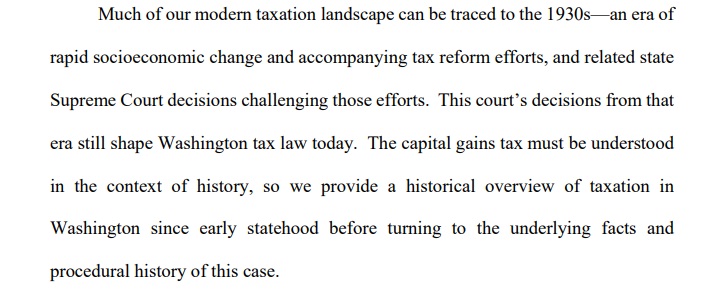
OLYMPIA, WA – The Washington State Supreme Court ruled this morning that the state’s new capital gains tax is constitutional. The 7-2 ruling on Chris Quinn v. State of Washington reverses a lower court ruling. A majority of the justices say the tax, which applies to profits from the sale of stocks and some other capital assets that exceed $250,000, is not a tax on income.
“The capital gains tax is a valid excise tax under Washington law. Because it is not a property tax, it is not subject to the uniformity and levy requirements of article VII, sections 1 and 2 of the Washington Constitution,” the justices say.
Justice Sheryl Gordon McCloud dissented. She says that deciding “whether to retain our regressive tax structure or to replace it with a more equitable one is up to the legislature through legislation and the people through constitutional amendment. The duty of the judiciary when faced with a direct conflict between a statute and the constitution is to uphold the constitution. The new capital gains tax violates article VII, section 2 of the Washington Constitution.”
Passed by the Legislature in 2021, the 7% tax is considered an effort to reshape the state’s tax system. Washington does not have a personal or corporate income tax and instead generates revenue primarily through a combination of sales taxes, property taxes, and the business and occupation (B&O) tax—a tax on the privilege of doing business in Washington as measured by gross receipts which depend largely on business and sales taxes, as well as property taxes.
Supporters of the capital gains tax say this results in people who make less money ultimately paying more taxes than those earning more.
View the full opinion here.
The Washington State Republican Party disagrees with today’s ruling.
“In response to the ruling, advocates are already calling to increase the income tax on capital gains and Democrats have discussed lowering the threshold to apply this tax to more Washingtonians,” the Party says in a press release. “This ruling is blatantly political and shows that our State Supreme Court is more concerned with pushing their political ideology than with their role of being impartial. It is now up to the citizens of Washington State to voice their opposition and reject the Democrat’s attempt to implement a comprehensive income tax.”
Kris Johnson, President of the Association of Washington Business, issued the following statement on the Washington Supreme Court’s capital gains tax decision:
“We’re disappointed with the court’s decision, which hurts Washington’s competitiveness and takes a step toward a state income tax, something voters have repeatedly rejected. This tax wasn’t necessary when lawmakers passed it in 2021, and it’s not necessary today, ” Johnson says. “Proponents argue the capital gains tax makes Washington’s tax system more progressive, but we have not seen an equivalent reduction in sales tax or business and occupation tax. It is simply a new tax at a time when it’s not needed. In the last five years, the Legislature has raised 22 other taxes which will collectively raise $40 billion over 10 years. Instead of constantly looking for ways to raise more taxes, we encourage lawmakers to consider ways to invest in the economy.”
Meanwhile, Senator June Robinson (D-Everett), Vice Chair of the Senate Ways & Means Committee and prime sponsor of Senate Bill 5096, released this statement following the Washington State Supreme Court’s ruling in Quinn v. Washington:
“Today’s decision is the culmination of over a decade of work to fix our upside-down tax code and rewrite the rules to make a system that’s fairer for everyone. With the capital gains excise tax, we will be able to better invest in our children, in our schools, in our teachers, in our families. We will invest in opportunities for our neighbors, making sure every person in every community has the supports and systems they need to thrive,” Robinson says. “Our state has one of the most regressive tax codes in the nation. A Washingtonian making low wages pays almost 18% of their income to state and local taxes, while the wealthiest among us pay about 3%. This places a terrible, disproportionate burden on working families and small businesses, and it makes our economy more vulnerable to a recession.

